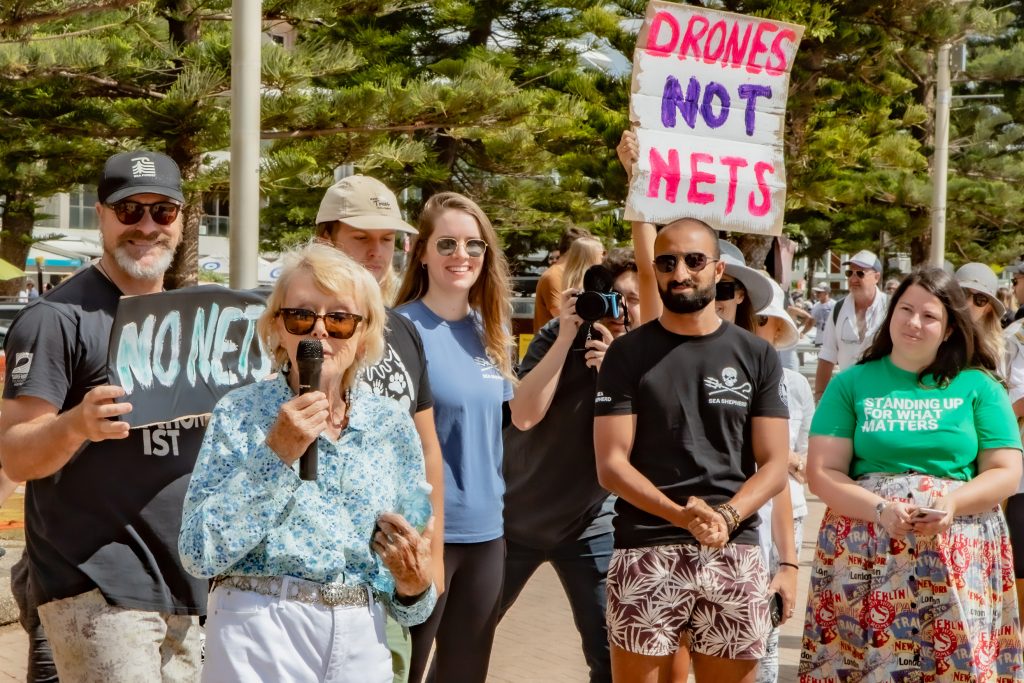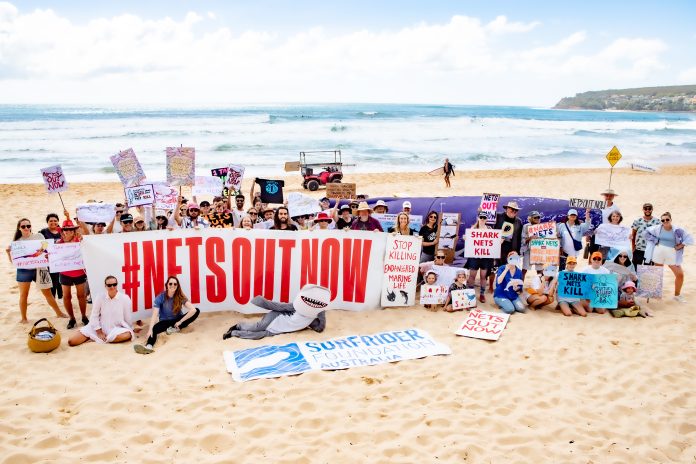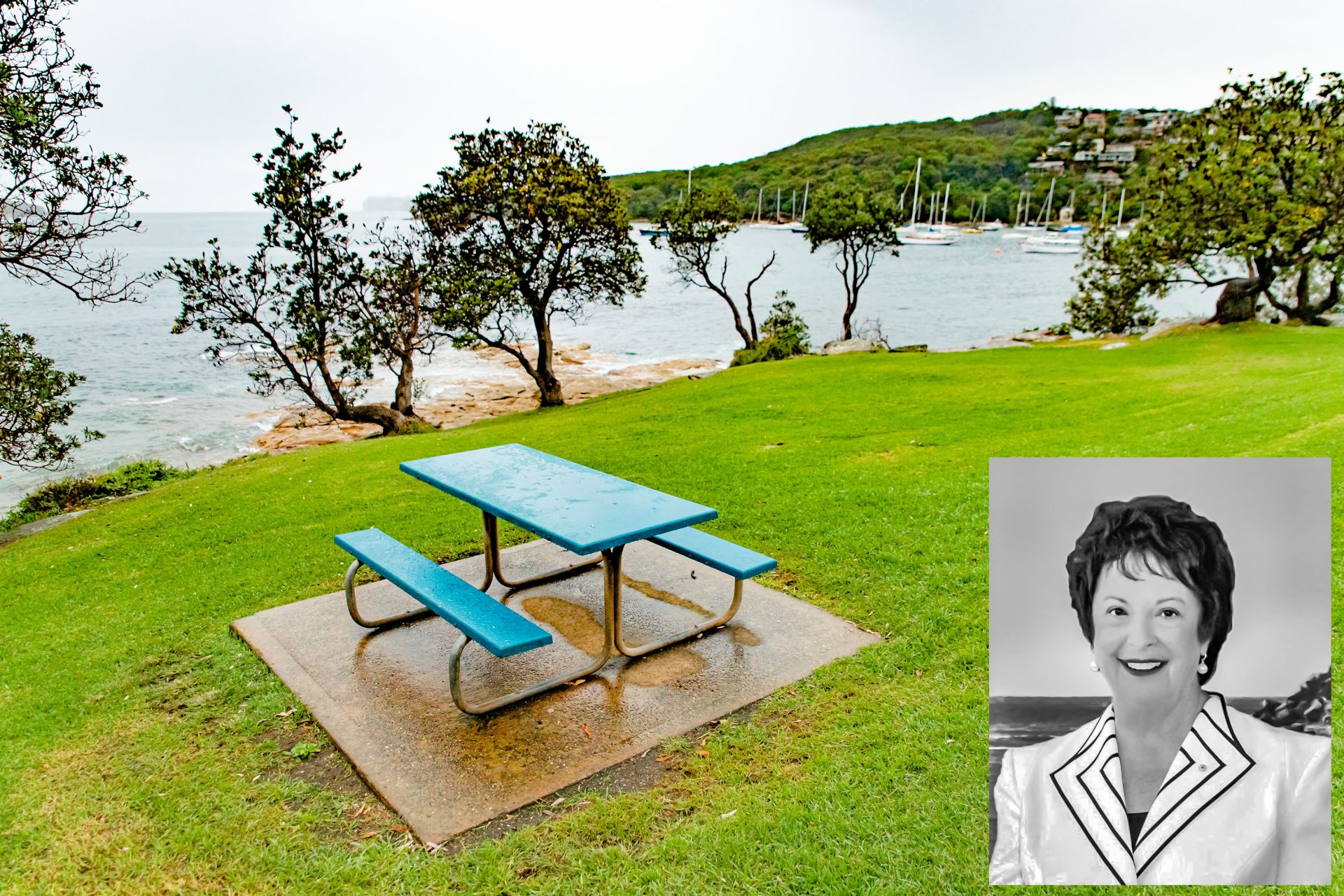A rally calling for the removal of shark netting along Australia’s East Coast took place on Manly Beach on 3 December, attended by a small but enthusiastic crowd. Organised by the Nets Out Now coalition, the campaigners demanded an immediate cessation of the netting program, to be replaced by modern, non-lethal deterrents. They claim the nets do little to deter shark attacks but instead kill a wide variety of sea creatures, many of them endangered or in serious decline.
The Shark Meshing Program is overseen by the NSW Department of Primary Industries (DPI), which reinstall the nets annually at the start of the peak public swimming season. They remain in place for eight months from 1 September to 30 April, to cover the warmer months of the year.
Although nets are in place in Queensland (55 beaches, controlled by the Qld Department of Agriculture and Fisheries) and central NSW, there are no nets in Victoria.
In NSW there are 51 nets at selected beaches along the 270km stretch of coastline from Newcastle south to Wollongong.
The rally gathered on North Steyne beside a giant inflatable whale. Campaigners say whales are more likely to be ensnared and drowned in netting than the ‘target’ sharks they’re designed to halt – white, tiger and bull sharks. This ‘top three’ of the five shark species regarded as most dangerous to humans inhabit Australian coastal waters.
The whales are trapped because the nets are redeployed near the tail end of the whale migration season (May to November), when mothers and new-born calves are more likely to swim closer to shore on their slow journey south.

Veteran diver Valerie Taylor calls for nets removal
Several speakers, including professional diver and acclaimed marine photographer and conservationist Valerie Taylor, addressed the seafront assembly.
Ms Taylor, 87, has, since 1962, made and appeared in countless documentaries, films and TV episodes involving sharks, including the iconic shark horror film Jaws.
In 2021 a National Geographic documentary on her life underwater, Playing with Sharks, celebrated her career as a marine conservationist.
Ms Taylor told the rally, “marine animals are intelligent. They mind their own business out there in an alien environment, but that’s where they belong. A shark doesn’t come up on land and chase you around, you have to go into its world. They are nowhere near as dangerous as the media will have you think.
“In my mind we have no right as a land-dwelling animal to go into the ocean and just kill because we think that sharks are waiting out there for somebody to swim past…. We owe the marine world to stop this mass killing. Hundreds of thousands [of marine creatures], many of them endangered, get caught and drown in those nets. It’s time that we pull them down…
“When you see a baby dolphin caught in the nets dead, covered in scratches where its mother tried to pull it out, it’s a very sad thing.”
Net flicks
The meshed shark nets were first developed and implemented by New South Wales Fisheries in 1937. Anchored between 400 to 500 metres offshore and marked by yellow buoys, they measure 150 metres in length (186m in Queensland) and six metres in depth. They are anchored to the sea floor between 4 – 10 metres below the ocean surface, to enable water craft to pass over them.
The nets have a mesh size of 50cm – 60cm, designed to trap sharks longer than 2m in length, which drown when they are effectively immobilised and cannot pass water over their gills.
The NSW DPIE report that, “since the introduction of the shark meshing program in 1937, there have been 36 unprovoked shark interactions at meshed beaches.” This has resulted in one fatality, 24 serious or minor injuries and 11 incidents where the person was not bitten.
Critics assert sharks bound for shore can easily swim over or around the meshing. Humane Society International claim 40 per cent of sharks that are snagged in the nets are caught on the beach side, whilst heading back out to sea.
Acoustic ‘pingers’ are attached to the nets along Australia’s East Coast, which emit tonal signals at around 132 decibels every 4 seconds to alert marine creatures – primarily cetaceans – to the net’s presence. Studies have shown that these reduce but do not prevent the entangling of non-target ‘bycatch’ (turtle, dolphins, seals, rays and whales).

The 2021-2022 annual report on the Shark Meshing (Bather Protection) Program revealed 325 of the 376 animals caught in NSW were non-targeted, often critically endangered or threatened species. These included: loggerhead, green and leatherback turtles; eagle and cownose rays; grey nurse and hammerhead sharks; a common dolphin and a humpback whale. Of these, 142 marine animals (38%) were released alive.
In April 2021 Northern Beaches Council voted to remove the shark nets along Sydney’s northern coastline from Manly to Palm Beach. However, the decision to actually remove them remains with the NSW DPI.
The DPI also manages the Shark Smart program, which includes an app for mobile phones that informs the public of shark activity reported around NSW beaches.
Shark Smart involves a number of measures: Surf Life Saving NSW’s drone surveillance program; electronic tagging of large sharks; and drumline technology that baits and catches sharks regarded as a threat to humans. Professional responders in boats then tag the individual sharks before releasing them away from beaches and populated areas.
Manly MP mauled
Several of the speakers at the rally were critical of James Griffin, NSW Environment Minister and Member for Manly.
Andre Borrel, filmmaker of the environmental documentary Envoy: Shark Cull, said, “There is an agreement between the Fisheries Department and the Environment Department called a Joint Management Agreement. It’s the only agreement that allows these things to run and kill protected and threatened species…. The Department of the Environment is a signatory to it.
“It can be terminated, and it should be terminated, but it hasn’t because of a lack of political will… It’s overdue for a five year review… It’s not keeping people safe and it’s causing far too much harm to the threatened and protected species in this state.
“The only reason that agreement hasn’t been terminated is because James Griffin doesn’t want to terminate it.”
Manly Observer contacted James Griffin, who gave us the following reply: “The future of shark nets needs guided by the best science and data possible to protect human life and important marine biodiversity. Many people are passionate about wanting them removed.
“I am absolutely committed to working with my colleagues, councils and the community to ensure we’re using the best technology available, and achieving the right balance to keep swimmers safe, while protecting vulnerable marine species.
“I know my community’s views, and I swim at our beaches regularly. Ultimately, the decision and next steps for shark nets sits with the Minister for Agriculture, and he has said that he wants to hear from the community about this issue – and I welcome that.”






